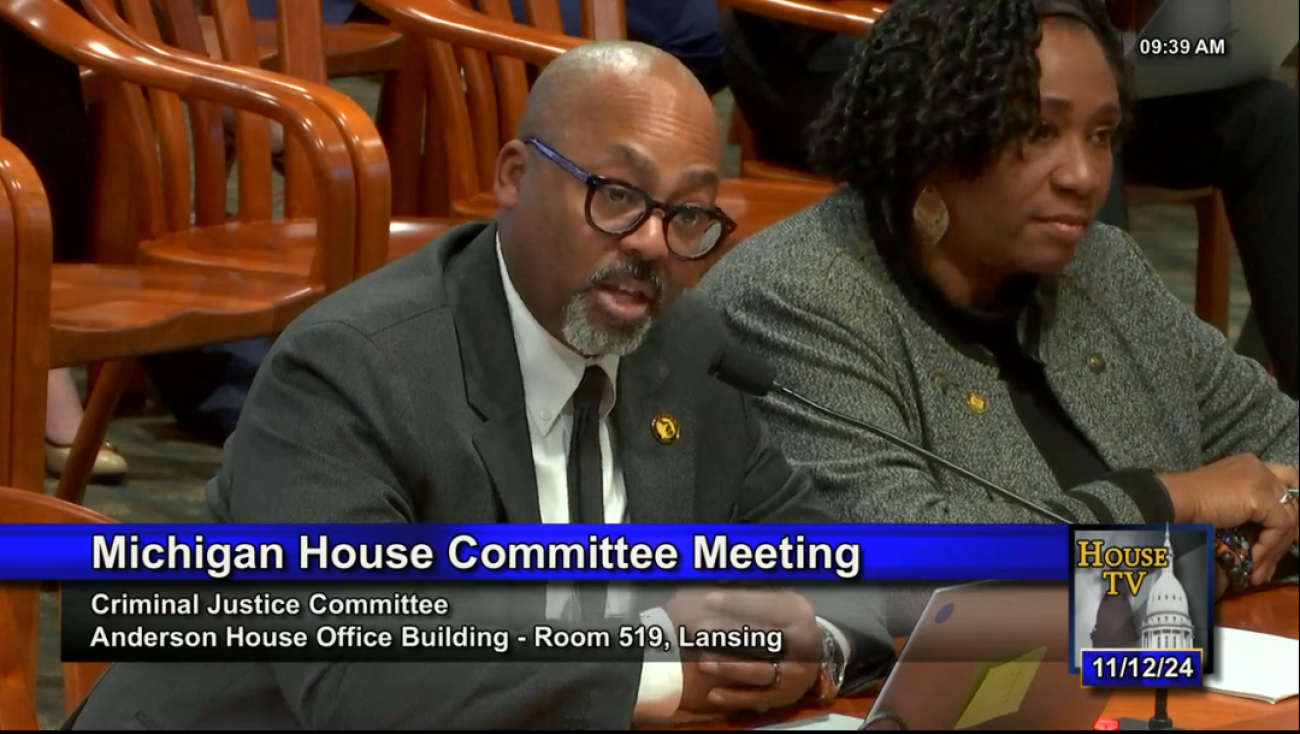Dems eye cash bail, ‘second look’ criminal justice reforms in Michigan lame-duck

- Bail and pretrial reform, “second look” at sentencing and productivity credits among criminal justice reforms percolating in state legislature
- Democrats hopeful, Republicans skeptical that the changes would improve the state’s criminal justice system
- Any proposal would need to pass before the end of the year, when a new session begins and Republicans take control of the House
LANSING — Michigan lawmakers are contemplating big changes to how courts handle bail during pretrial proceedings and a possible “second look” at prisoners’ existing sentences.
The Democratic proposals are among several major criminal justice reforms pending in the Michigan Legislature — but with just weeks left in the session, it's unclear whether they'll reach Gov. Gretchen Whitmer's desk.
Lawmakers this week heard testimony on bills aimed at reducing local courts’ reliance on cash bail for low-level, nonviolent crimes and setting statewide standards for the process, a change long sought by reform advocates.
Officials also heard from proponents of “Second Look” legislation, who rallied at the Capitol Tuesday in support of plans that would give prisoners with lengthy sentences the option to petition for a reduction in their sentence after a certain period of time.
The bills have largely languished so far in Lansing, though Democrats backing these and other criminal justice initiatives see a possible path to get them to Whitmer during the “lame-duck” session, after which point Republicans will retake majority control of the state House.
Related:
- Controversial youth detention tool goes live in Michigan. Is a fix coming?
- Critics fear reforms may boost incarcerations of minority youths in Michigan
- Michigan poised to restrict guns at election sites under Democratic bills
Rep. Kara Hope, a Holt Democrat and chair of the House Criminal Justice Committee, told Bridge Michigan that she’s hoping to see at least one major criminal justice reform get signed into law before the end of the year.
“Any one of them would be humongous” to moving the state’s criminal justice system forward, Hope said. But she acknowledged time is running short.
“I'm optimistic, but I'm not delusional,” she said.
Critics of the latest efforts to change Michigan’s criminal justice system are concerned the proposals aren’t tailored to local community needs and could instead hamper local law enforcement and judicial efforts to keep residents safe.
Rep. Graham Filler, R-St. Johns, told Bridge that past bipartisan criminal justice efforts he’s worked on, like making the expungement process easier or raising the age of who is considered an adult by the criminal justice system, were borne of state-specific problems that needed solving.
He’s not convinced the latest crop of legislation would achieve similar results.
“They've not come from the ground floor of, ‘We have a public safety fairness issue in the state of Michigan,’” Filler said. “It’s going to be really hard…to get Republican support, and I think hard for Dems to get support, because I don't think people see that there's a huge issue.”
Here’s a closer look at what criminal justice issues lawmakers have considered this session, and where they stand as the year winds down.
Bail reform
The state House Criminal Justice Committee is considering a package that if enacted would require judges to take a defendant’s ability to pay into account when setting cash bail requirements and only doing so in cases where a person is charged with a serious crime and poses significant risk.
Supporters of the effort argue the changes would result in a fairer criminal justice system that doesn’t punish people for being poor, pointing to successes with the city of Detroit’s recent pretrial bail reforms required under a lawsuit settlement with the ACLU of Michigan.
“We no longer have people not knowing who's going to care for their children, who's going to make sure that their elderly parents are taken care of, because they're sitting and sitting in the Wayne County Jail,” said William McConico, chief judge of the 36th District Court and a former state lawmaker.

Critics remain wary of implementing statewide bail reforms in Michigan, particularly as other states like New York roll back similar efforts.
Jeff Clayton, executive director of the American Bail Coalition, argued that Michigan’s existing bail rules are “the gold standard” and already offer a level playing field for when and how judges should impose bail.
And Rep. Mike Harris, a Waterford Republican and former police officer, called bail a “powerful financial incentive for good behavior,” arguing any attempt to release more people accused of crimes out of jail without bail would be “a dangerous move that threatens public safety.”
‘Second Look’ at prison sentences
Other legislation pending in the state House and Senate would allow most prisoners to petition for a reduction in their overall sentence after serving part of their sentence if they are no longer deemed a risk to society.
Chuck Warpehoski, program director of the Michigan Collaborative to End Mass Incarceration, said allowing a “second look” for low-risk prisoners with lengthy sentences could help ease the pressure on the state’s overburdened corrections system while rewarding prisoners who have proven rehabilitation.
Warpehoski said he believes there’s a path to reform in lame-duck, noting that advocates are open to changes — after negotiations with lawmakers concerned that the initial proposal of 10 years before prisoners could begin petitioning was too short a time, proponents of the bills agreed to a 20-year waiting period.
GOP lawmakers, prosecutors and others have slammed the legislation as extreme, arguing it would lead to the release of dangerous criminals, re-traumatize victims and burden courts with a surge in resentencing requests.
Wrongful imprisonment
Lawmakers are also considering changing eligibility requirements for wrongfully convicted people seeking funds under the state’s Wrongful Imprisonment Compensation Act, a move that would likely allow many people currently ineligible for relief to apply.
The legislation would adjust the state’s 2016 law allowing wrongfully convicted people to collect $50,000 for each year of wrongful imprisonment. ProPublica previously reported that the law’s requirements have resulted in compensation delays or denials for people who were convicted and later found innocent.
Legislation reforming the system is pending in both the House and Senate. A House panel moved the bill to the floor in March, and the Senate Civil Rights, Judiciary and Public Safety Committee reported its version of the bill to the Senate floor Thursday.
End juvenile life without parole
House and Senate legislation introduced last year would eliminate juvenile life without parole sentences in Michigan, a concept spurred by state and federal court decisions that determined automatically sentencing minors to life in prison without parole was unconstitutional.
The bills remain pending in committee in both the House and Senate and would eliminate life without parole sentences for youth under 19, capping the maximum sentence at 60 years for serious offenses. Some bills in the package include Republican co-sponsors.
As proposed, the legislation would also allow for parole review after 10 years in cases where the youth’s age and maturity level, family home environment, circumstances of the offense and possible peer pressure factor into the crime.
“Michigan law needs to recognize that juvenile offenders deserve a chance at rehabilitation,” Sen. Jeff Irwin, D-Ann Arbor, said in a statement when introducing the legislation last year. “We shouldn’t turn our backs on juvenile offenders and throw away the key.”
Productivity credits
Several Democratic lawmakers have also backed legislation allowing eligible inmates to knock off up to 20 percent of their minimum prison sentences by completing educational or vocational programs, though previous efforts to move the bill forward stalled amid legal questions.
The plan would effectively reverse a 1978 ballot initiative that ended Michigan’s previous credit system for good behavior for most inmates and require inmates to complete their minimum sentence before being eligible for parole consideration.
Because it would change a voter-approved law, the plan would require approval from three-quarters of the state legislature and likely be a hard sell in the closely divided House and Senate.
See what new members are saying about why they donated to Bridge Michigan:
- “In order for this information to be accurate and unbiased it must be underwritten by its readers, not by special interests.” - Larry S.
- “Not many other media sources report on the topics Bridge does.” - Susan B.
- “Your journalism is outstanding and rare these days.” - Mark S.
If you want to ensure the future of nonpartisan, nonprofit Michigan journalism, please become a member today. You, too, will be asked why you donated and maybe we'll feature your quote next time!




